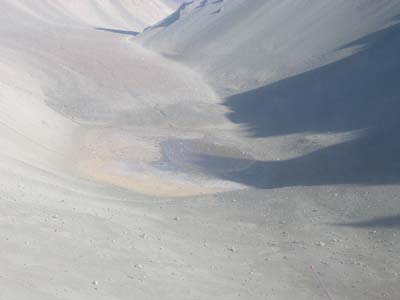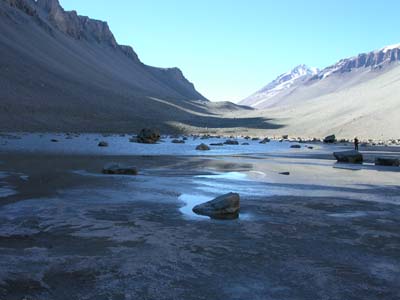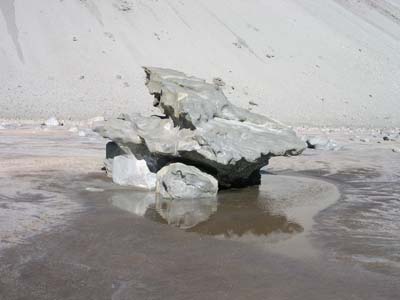Don
Juan Pond
Don
Juan Pond isn't spooky so much as it is surreal. When we flew in
by helicopter, we could barely see that it was there. Then after
we landed the light hit it just so, and the water seemed to appear.
The pond and surrounding area contain rocks carved into fantastical
shapes by wind-blown particles of ice or stone. These rocks, which
are known as ventifacts, give the place the curious look of a sculpture
garden. Salts left behind by evaporated water create oddly beautiful
patterns on the ground.
 Pond
as seen from a helicopter
Pond
as seen from a helicopter |

Pond as seen at ground level |
 Ventifact
Ventifact |
 Salt patterns
on the ground
Salt patterns
on the ground
|
Perhaps the strangest feature of
Don Juan Pond, though, are the small waves that ripple across its
entire surface. The other water bodies we'd seen were covered with
ice except for relatively small moat areas that developed along
the edges as the summer progressed. Don Juan Pond, in contrast,
was pure liquid.The fact that
the pond is much smaller and shallower than the lakes we'd been
visiting could have something to do with that.
Municipalities
sometimes sprinkle salt on roads during the winter.
By
lowering the freezing point of water, the salt increases
snow melt and helps prevent the formation of ice on
the roads.
|
|
But
even during the height of the Antarctic winter when air temperatures
drop to -50 degrees Celsius, the pond remains at least partially
unfrozen. This is because the pond is quite salty, and dissolved
salts lower the freezing point of water by interfering with
the bonding among water molecules.
The pond contains so much salt
in fact - some 10 to 15 times that of normal seawater - that
it is thought by many to be the saltiest body of water on
earth.
|
Don Juan Pond was discovered in the South Fork of the Wright Valley
in 1961 during field reconnaissance by a U.S. Navy helicopter.
The pond was named after Lieutenants Donald Roe and John Hickey,
both of whom were members of the first field party to study the
pond.
-Karen




